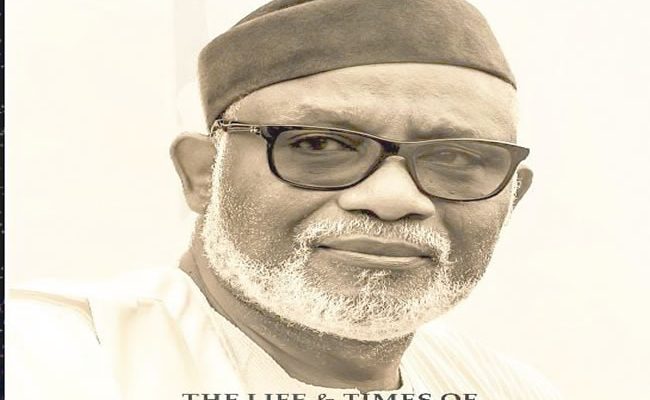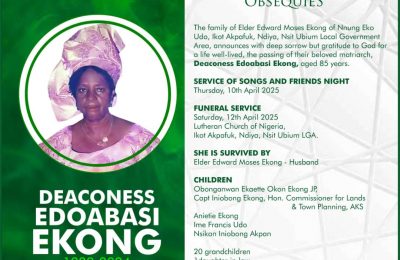A review of Wale Okediran’s Aketi: The Life and Times of Arakunrin Oluwarotimi Akeredolu by OLUFEMI ADEOSUN. Accessible Publishers; 412 pages.
TO be so invited by Dr Wale Okediran to review this book on Aketi, a man with a legendary status both in life and in death, presents a seeming paradox to me: it is a fascinating opportunity, and at the same time, it constitutes an arduous task. It is intriguing because Aketi, as he was fondly called, remains a riveting personality whose life personified exceptional courage, humility, a tenacity of purpose and numerous other virtues that are a rarity among many of today’s generation.
I equally consider my task before you this afternoon` a challenging one because I would have to carry out this review on the subject matter whose life’s trajectories (as chronicled in the book) were laced with many defining moments in less than one hour.
‘Aketi: The Life and Times of Arakunrin Oluwarotimi Akeredolu’ is the compelling story of a multi-dimensional thinker who had a finger in many pies and equally excelled in all. Written in a witty narrative style by Wale Okediran-a medical practitioner turned modern griot- the book depicts the promising background, childhood fantasies, uncommon bravery, resilience, existential struggles, and the eventual triumph of the former student leader, erstwhile National Bar Association (NBA) President, ex-Attorney General and Commissioner of Justice, Ondo State and two-term governor of the State, Oluwarotimi Odunayo Akeredolu (SAN).
The biographer is a renowned fiction writer who, despite his medical background, emerged in the Nigerian literary space in 1987 with his first novel, ‘Rainbows are for Lovers’. Since then, apart from cementing his place among the best writers of post-independent Nigeria in sheer volume and topicality, he has equally carved a niche for himself as a biographer of note, having done several works in this unique genre of literature.
However, this new outing must have had a profound impact on him, particularly given his sense of loss occasioned by the death of a fraternal friend with whom he had shared so many emotional moments. Okediran disclosed in the preface to the book that Arakunrin himself had given him the nod to write this book before he succumbed to the cold hands of death precisely a year ago.
Published in 2024 by Accessible Publishers Limited, the 412-page book is structured into eight broad parts, with the parts further subdivided into thirty unequal chapters. However, the parts and sub-units are adroitly woven to make an organic whole. This form constitutes a building block in a flow of cryptic symbols and images capable of holding the readers spellbound, even from the first page.
The book’s strength lies in the author’s captivating portrayal of the defining moments and events in the life of Aketi, the enigmatic character of the narrative. The author deliberately juggles third-person and omniscient narrative styles in framing the plot.
This mode enables him to assume the role of a narrator in certain instances and, in others, empowers him to share the narration with specific people and personalities who now recount their encounters based on their experiences with the eponymous character. In a way, I presume that Okediran may have adopted these narration styles in a manner reminiscent of the Brechtian alienation technique of storytelling to prevent the readers from any form of emotional attachment to the compelling events as they unfold in the narration.
In Part One of the book, the author chronicles, in the most assuring yet telling manner, the story of the formative years of Aketi- his ancestral background, academic pursuits, exuberances, and exemplary courage, even in the face of life’s undulating topography.
The part also features perhaps the most defining moments in his early life, where destiny thrust upon him the burden of care for his mother and younger siblings upon the death of his father, Jacob Oluwole Akeredolu, popularly known as “Eniire”. Although largely rudimentary, this part remains pivotal as it bears eloquent testimonies to the evolution of the life of the iconic figure, Aketi. This is arguably so because the events and occurrences in his formative years helped shape his social and political outlooks in adulthood. For instance, his uprightness, honesty, courage, resourcefulness, deep insights and admirable sense of humour are the character traits later manifesting in all his endeavours, whether in the private or public sphere, as he dedicated much of his adult life to public service.
A particular occurrence in the book that exemplifies Aketi’s courage was the instance of his brawl with the authorities of the NYSC Orientation Camp in Awgu, Enugu State, where he had his compulsory one-year national service.
The terror personified Camp Commandant-Capt. Miller had hit him with a swagger stick, perhaps in a bid to pound him into submission on account of an alleged romance with an unnamed beautiful Corps member. The young Aketi was said to have reacted fiercely to his abuser’s act with a rain of slaps. This singular act of bravery would have earned him a six-month service extension were it not for his colleagues at the camp who jettisoned tribal and religious affiliations to confront the power that be.
More than four decades later, the book also records that Aketi took a similar gallant role when the security of lives and property of the people of the southwest region was under constant threat by the marauding herders. He was said to have played significant roles in establishing the Western Security Network, code-named Amotekun, to combat their menace, even when it seemed that the Federal Government, at that time, was not favourably disposed to the idea.
Part Two of the book gives an account of his professional practice: from having a short stint at the Legal Aid Council as a youth corps member, his foray into law practice, which began in 1978, to his partnership with his colleague at the bar Akinlolu Olujimi (SAN), with whom he established and ran the Olujimi and Akeredolu Law Firm.
The author also outlines some landmark cases the firm successfully handled. As we follow the chronicles of his professional life in the book, we can see that Aketi was not into law practice to amass wealth; rather, he saw the law as a tool to serve humanity. His commitment to the activities of the Nigerian Bar Association (the umbrella body of lawyers that caters for and regulates the affairs of its members about law practice) was rewarded when he was elected the President of the association in 2008.
In Part Three, the author provides a detailed account of Akeredolu’s involvement in politics: his political ideology, his first election as Governor of Ondo State, the disappointment felt mainly by those he trusted and his eventual re-election as a two-term state governor.
The Fourth part, which is a buildup on the third, provides illuminating insights on the electioneering strategies deployed by Aketi to seek a return to Alagbaka Government House for a second term. It also documents his eventual successes and challenges, particularly his strained relationship with his deputy, Agboola Ajayi. While Part Five discusses his major achievements in office, Part Six details his thoughts on the country’s salient socio-economic and political issues. The seventh and the eighth parts appear to be the most emotional moments in the narration, as people from various walks of life take time to pay tributes to a man generally viewed as typifying the best ideals of courage, love, resilience and who has, like all mortals, transited to a higher realm of existence.
The book also addresses some of the contentious issues that dogged the personal and political life of Aketi, particularly the controversies about the place and roles of his lovely wife, Betty Akeredolu and his son, Babajide Akeredolu, in the affairs of the state that he governed for eight years. Okediran narrates their fitting roles in the personal and political life of the legal titan. He, however, does not neglect the roles of Aketi’s siblings and his other children.
Just as every work of art in its framing wholeness is regarded as a living and progressive project within the literary space, Okediran has framed his narrative in this new outing as best as he could and, perhaps, within the confine of his convictions. It is now left to the critics and readers alike to dissect the ‘whys’ and ‘why nots’.
Despite his near perfection and impeccable efforts to rid the book of any mistakes, like all mortals, Okediran was still unable to avoid some negligible errors common to most exceptional writers. Of course, these slips do not diminish the excellence of the work.
A perfect work is never finished, and a finished work is never perfect. As Kayode Fayemi implies in his book ‘Nation Building as an Unfinished Business’, writing is an unending task.
Against this background, therefore, it is my singular honour and privilege to formally recommend this book to all seekers of knowledge, students of politics and power dynamics, historians and sociologists in the hope that it will further energise a robust debate on the place of man in the face of time, particularly on the vexatious issues of individual freedom, political correctness, courage, and the role(s) of convictions in the face of existential struggles whether in the garbs of politics, inter-personal and communal relationships, acquaintances, or in matters of personal choice.
This remains a perfect way of keeping Aketi’s memories alive. After all, the core of his humanity, as the author has ably demonstrated in this cerebral work, is anchored on the supremacy of ideas, ideas that facilitate consensus building, consensus building that produces a wide range of resolutions, and resolutions that proceed from healthy public debates wherein superior arguments are allowed to dictate the rules of engagement.
- Dr Adeosun of the Faculty of English and Literary Studies, Ekiti State University, Ado Ekiti, presented this review on December 26 at the one-year memorial service held for Akeredolu in Owo, Ondo State.
READ ALSO: Akeredolu, courageous leader, fearless soldier — Fayemi







